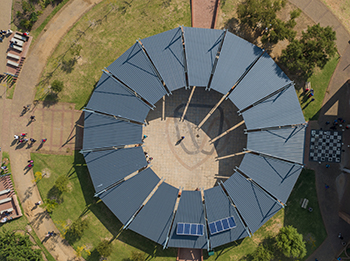Latest News Archive
Please select Category, Year, and then Month to display items
16 February 2024
|
Story ANTHONY MTHEMBU
|
Photo ROSINA MOTHIBA
 Prof Matseliso Mokhele-Makgalwa: Vice Dean; Research, Engagement and Internationalisation in the Faculty of Education at the University of the Free State (UFS).
Prof Matseliso Mokhele-Makgalwa: Vice Dean; Research, Engagement and Internationalisation in the Faculty of Education at the University of the Free State (UFS).
The Faculty of Education at the University of the Free State (UFS) proudly announces the appointment of Prof Matseliso Mokhele-Makgalwa as Vice Dean of Research, Engagement and Internationalisation, effective 1 January 2024. With a wealth of experience and a fervent dedication to academic advancement, Prof Mokhele-Makgalwa’s appointment marks a significant stride towards enhancing the faculty’s global presence and academic prowess.
Transitioning into a new role
Transitioning seamlessly from her previous role as Acting Vice Dean of Research and Postgraduate Studies, Prof Mokhele-Makgalwa perceives this new appointment as a natural progression, elevating her responsibilities to spearhead research endeavours, foster engagement, and cultivate international partnerships within the faculty. Embracing this pivotal role with enthusiasm, she underscores the importance of collaborative efforts among faculty members, securing research funding, and ensuring the quality and impact of scholarly outputs.
“I appreciate the opportunity to contribute significantly to the faculty’s research, engagement and internalisation efforts,” says Prof Mokhele-Makgalwa. “I look forward to collaborating with the faculty staff members to advance our academic initiatives on a broader scale.”
A vision of progression for the faculty
At the heart of her vision lies a commitment to realise the UFS’s Vision130, wherein Prof Mokhele-Makgalwa aims to elevate the international profile of the faculty, foster impactful research, promote engaged scholarship, and facilitate knowledge exchange on a global scale. Her strategic objectives also include positioning the faculty among the top three education schools nationally, reflecting her dedication to academic excellence and institutional advancement.
Renewable energy systems an economical investment for the UFS
2017-06-14

The Qwaqwa Campus Arena equipped with freestanding
roof solar panels.
Photo: iFlair Photography
Renewable energy systems are said to be very expensive to implement initially, but in the long run they provide high economic returns.
With their decision to install renewable energy, the University of the Free State Department of Facilities Planning has now also adopted this innovative technology. They have chosen less capital-intensive solar power-generating options to generate electricity in various buildings and parking areas on all three UFS campuses.
“As per the UFS Energy Management Policy, all designs incorporate efficient, renewable energy sources varying from LED lights to solar power,” says Anton Calitz, Electrical Engineer in University Estates’ Department of Facilities Management.
South Campus taking the lead in renewable energy usage
In December 2016, a total of 26 solar-driven LED street-light poles were installed at the recently built Legae Residence’s parking area and the perimeter security area on the South Campus. This low-maintenance system improves security after dark and is independent of the national power supply, which is an important advantage during power outages. With no requirements for major earthworks and cable setting, operational costs are reduced.
The recently built infrastructure also takes pride in being the first to have a greywater system installed. This system will also be installed at three other residences on the Bloemfontein Campus in 2017. Greywater is made up of bath, shower, and bathroom sink water. The water is reused for toilet flushing, as well as for irrigation purposes.
Various UFS electrical operations to depend on solar power
On the Bloemfontein and Qwaqwa Campuses, the computer laboratories as well as the Thakaneng Bridge Student Centre and the projected Afromontane Research Centre will be equipped with freestanding roof solar solutions during 2017. These systems are designed to operate independently of the power grid (Eskom).
The systems only operate during sunlight hours when the PV solar panels are heated by the sun, making them suitable for operations such as ventilation fans, water pumps, and small circulation pumps for solar thermal water-heating systems.